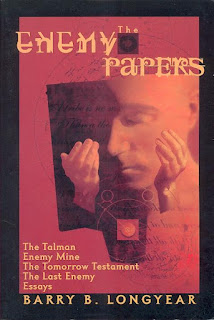Longyear, Barry B. "Enemy Mine." Isaac Asimov's Science Fiction Magazine, September 1979.
This article is part of my attempt to read all the 155 stories currently (as of 1 November 2022) on the ISFdb's Top Short Fiction list. Please see the introduction and list of stories here. I am encouraging readers to rate the stories and books they have read on the ISFdb.
ISFdb Rating: 9.00/10
My Rating: 9/10
"The Dracon's three-fingered hand flexed."
On an unexplored planetoid, a human and a Dracon (or "Drac") have crash landed during a battle between the two species. They must survive both the inhospitable landscape and their hatred for each other.
Reads like the premise of many a Hollywood script, and as expected, the two learn to work together and eventually develop a strong bond during their long months of confinement. However, unlike many stories that follow this plot-line, interracial or not, "Enemy Mine" has an engaging plot and is ultimately a genuinely touching story. The interracial aspects are strong, though they are to be expected (the racist human later experiences racism directed toward him when visiting Dracon society, etc.), but the friendship and commitment to another's cultural responsibilities is what I find mostly intriguing.
Along with hefty thematic elements, Longyear builds an excellent environment on Fyrine IV, the planet on which the two are stranded. The pair of enemies begin by struggling against the extreme elements, and then must build a life for themselves by seeking proper shelter, food and making clothes and other necessities with the little they have at hand. The details in which they learn to build and stitch are reminiscent of Daniel Defoe's Robinson Crusoe, who also eventually discovers a companion. The story can be expanded by discovering more of Fyrine IV, and Longyear did expand the novella into a full-fledged novel in 1998 as "Enemy Mine: The Author's Cut," published alongside new stories set in the same universe, as The Enemy Papers (Borealis, 1998). I have not read the works but will likely do so at some time.
Another aspect of the novella that I quite like, though it is not discussed too much, is the notion that the war between humans and Dracs is for naught, as our human mentions at the story's opening that the battle was essentially pointless, in a part of space no one really wanted. This is elaborated later on, but only slightly, and we are to understand that the hatred between the two species developed from a chance encounter as they were each attempting to expand their species. Yet there is no value in that part of space, so the war is driven partly by pride, the desire to conquer and perhaps the need each species has to burrow unhindered into deeper space. One thing we discover later in the story is that Dracons and humans are, despite their obvious differences, essentially the same species. Like humans they tend to other those who are unlike them, placing themselves on a higher rung. They have religion, a kind of caste system, and a knack for bureaucracy. Not entirely original, but it serves to drive home much of the story's thematic concerns.
"Enemy Mine" swept the novella awards for stories published in 1979, being awarded the Hugo, the Nebula and the Locus in the novella category. Six years following its publication it was released as a major motion picture, Enemy Mine (1985), directed by Wolfgang Petersen, and starring Dennis Quaid and Louis Gossett, Jr. I first watched the movie, in French, around 1987 or '88 with my brother, and read the novella not too long afterwards in the anthology Nebula Winners Fifteen (ed. Frank Herbert, Harper & Row, 1981). My brother and I both enjoyed the movie, and I loved the novella, so much so that I gave it to my mother to read, who, an avid reader, disliked science fiction. She too loved the novella, and may have shed a tear if memory serves. I re-read the novella a couple years ago and enjoyed it once again then, and re-read it yet again a few days ago, and it holds up nicely.


Tried the tv series yet?
ReplyDeleteI was very slow to take on the the task, as it initially felt, at the time of publication of reading the novella, though I was a fairly regular reader of ASIMOV'S SF magazine (as it wasn't yet called), but becoming an increasingly reluctant one, not least because of the atrocious "Momus" stories by Longyear which editor George Scithers was running in nearly every issue...the most dumbed-down sort of fake Jack Vance stories one could hope to avoid, and the judgment of time has not been kind to them. But when I finally tried "Enemy Mine", I was rather impressed at what Longyear was capable of doing, and wondered no little why he didn't strive for at least this level of work more often. Still haven't seen the film, nor the tv version.
Todd, I have not seen the tv version and watched the film years ago (though I recently watched the Siskel & Ebert review of the movie, which I did enjoy!). I too read some other Longyear stories in the IASF issues of the 1980s, and did not care for them. As much as I like "Enemy Mine," I never bothered seeking out his other work, probably as a result of those few stories.
ReplyDelete